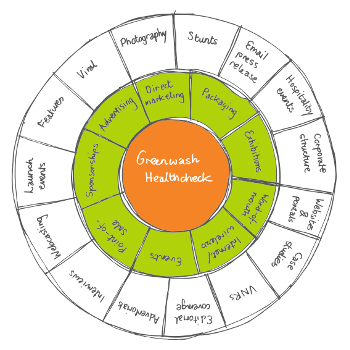Greenwashing includes false ‘green’ communication and advertising strategies used by companies to differentiate themselves from competitors and show climate commitment

Fàtima Vidal Ayuso
Teaching Assistant in the Business and Management Strategy Department
_
The transformation towards a more sustainable lifestyle is already a reality. A study by the Spanish Organization of Consumers and Users (OCU) indicates that more than 70% of people living in Spain make their purchases according to ethical and sustainable criteria. However, although we can see that there is a growing trend towards sustainable, ecological, or organic products in our environment, there are many nuances. In recent years, the increase in sustainable awareness on the part of consumers has been accompanied by a trend in the business sector called greenwashing.
Greenwashing includes false ‘green’ communication and advertising strategies used by companies to differentiate themselves from competitors and show climate commitment
The concept of greenwashing comes from the word whitewashing. The term was first used in the 1980s by activist and researcher Jay Westervelt, who accused the hotel industry of falsely promoting the reuse of towels among guests as an environmental strategy when, in fact, it was part of a cost-saving measure. Westervelt claimed that this action had no effect on the fight against climate change, given the pollution and environmental damage that hotels cause.
What is greenwashing?Since then, the use of the concept has spread, but what is greenwashing? This term includes the “green” communication and advertising strategies used by companies to differentiate themselves from the competition and convey a supposed concern for the environment. Often, they are not real, but rather bad practices that certain companies carry out with the aim of conveying a false idea.
The practice arises from the high demand for sustainable products, consumer interest in the climate emergency, and favourable regulation towards these services
Nowadays, both consumers and companies are more environmentally conscious. Even so, greenwashing is a practice that continues to grow because of the virality and repercussions that these actions have on companies. For example, because of the high demand for sustainable products, the interest that is being generated among consumers about the climate emergency, or regulations that favour this type of products and services.
How we identify it?As the following image, taken from a study carried out by Futerra and BSR, shows, the communication channels that affect greenwashing are many

It is worth noting that, beyond having a direct effect on the environment, as practices and products that do not really contribute to its protection are promoted, there is also a direct effect on consumers: one must be careful when consuming certain products and services and analyse whether there is a possibility that the company is carrying out greenwashing.
This same study recognizes different points to bear in mind when buying products that could be included in this practice. The most relevant are:
- Ambiguous or confusing language: words or terminology that do not have a clear meaning and may cause consumer confusion about the origin of the product.
- Green products made in unsustainable companies: products that are sustainable and efficient but manufactured in facilities that pollute the environment with impact on seas, rivers, or others.
- Eloquent imagery: images with green tones, as well as images of nature, which lead the consumer to think of sustainable products.
- Relevant messages: to give importance to certain aspects or components of a sustainable, efficient, or ecological nature, even if the product as a whole is not.
- Best in class: attributing sustainable facts, however minimal, to stand out from the competition.
- Unverifiable or unreliable data: using language that consumers often do not understand or outright inventing data or studies to validate the product.
At the same time, this type of advertising can directly affect other companies dedicated to sustainable consumption, and efficient and ecological products, etc. For this reason, more and more companies are trying to be transparent about the processes carried out, the components used in the production of the product or even the chosen packaging. In this way, they are also trying to encourage consumers to follow a sustainable and environmentally friendly lifestyle, to understand their customers’ needs, and anticipate them by going beyond fashions.
Thus, as consumers we must promote sustainable consumption with those companies that really strive to improve the environment and are actively participating in the cause. And this is where deeds are worth much more than words and advertising campaigns.